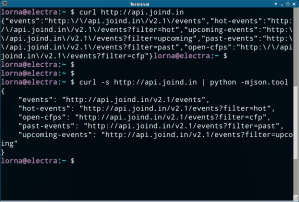Day Camp 4 Developers is a virtual conference, and it’s $40 (about 25 quid for UK people). If you can’t make it on the day, just get the video ticket and download the recorded sessions later. What I’m trying to say in this paragraph is that there are quite literally no excuses for missing out on this :)
Continue reading
Are Subqueries RESTful?
@lornajane sory for getting on your nervs with #rest,but are subquerys (like couchDB does) restfull to? is there a rule? like …/?type=bla
— Maximilian ‘Berghoff (@ElectricMaxxx) June 12, 2013
The blog seems like a good place, as I can put examples and all kinds other things here, and waffle at length (which is really why I like it!). Because when condensed to tweet form, the answer is really “it depends”.
The Problem(s)
REST is all about representations of resources. They might come in different formats, and they might appear at their own URI as well as in one or more collections, but essentially you just get a representation of a thing. This is great, apart from when it isn’t.
- What if you want a smaller result set with only a limited number of fields?
- What if you want related data? For every resource in a collection?
PHP Version Adoption

What’s alarming about this is that the left half of this graph represents unsupported versions of PHP. PHP 5.2 has been end of life since January 2011. This doesn’t mean that you can’t use it any more, but it does mean that in terms of security updates, you are out of luck. Some distributions will try to retro-fit some of the fixes but essentially your PHP applications seem a bit lacklustre because, well, you’re using technology from 2006. Continue reading
Simplest PHP Generator Example
Writing a Generator
The generators use the yield keyword to feed values out as they are iterated over. In code, they really look a lot like a function (or method):
<?php
function getValues() {
// totally trivial example
yield "Apple";
yield "Ball";
yield "Cat";
}
Continue reading
Setting Multiple Headers in a PHP Stream Context
In fact, you’ve been able to pass this as an array since PHP 5.2.10, so to set multiple headers in the stream context, I just used this:
<?php
$options = ["http" => [
"method" => "POST",
"header" => ["Authorization: token " . $access_token,
"Content-Type: application/json"],
"content" => $data
]];
$context = stream_context_create($options);
The $access_token had been set elsewhere (in fact I usually put credentials in a separate file and exclude it from source control in an effort not to spread my access credentials further than I mean to!), and $data is already encoded as JSON. For completeness, you can make the POST request like this:
<?php
// make the request
$response = file_get_contents($url, false, $context);
Hopefully this will help someone else doing the same thing next time (or at least I know I can come back here when I can’t remember!), the array approach seems more elegant and maintainable to me.
What Goes in Source Control?
The Mathematics of Recruitment and Training
This isn’t a rant about salaries, the skills of new graduates, or the trials of dealing with recruiters, although each of those is worth a post in itself. It’s about the mathematics of providing your organisation with the talent it needs at the time that it needs it. Continue reading
Pretty-Printing JSON with Python’s JSON Tool
curl http://api.joind.in | python -mjson.tool
You need python installed, but the JSON extension is probably included, and that’s all you need for this tool. The result is something like:
You can also use this approach to present JSON data that has been captured to another file, for example, it’s a handy trick that I use often when developing something with JSON as a data format.
Video Course on Learnable: OOP PHP
On a related note, I’m also doing a Sitepoint “Talk with the Experts” session on 11th April (early morning UK time, as a special treat for everyone in Europe and further east, that doesn’t happen often!). There are more details here: http://www.sitepoint.com/forums/showthread.php?1012242-Talk-Object-oriented-PHP-with-the-Experts and I hope you can join me then.

